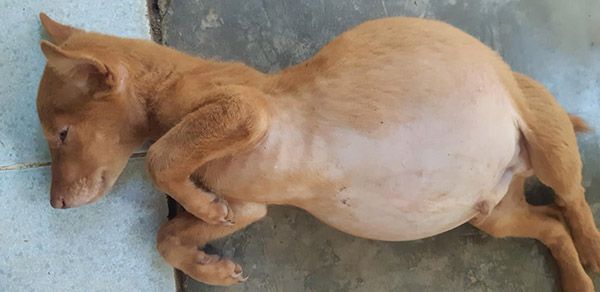
Dogs can experience a condition known as abdominal sinus fluid retention, also known as ascites. This condition is characterized by the buildup of free fluid in the abdomen, leading to a distended belly. Ascites can be a symptom of underlying conditions such as liver disease or heart failure. It is essential to address the underlying cause to effectively treat the fluid retention. In this article, we will explore various home remedies and treatments that can help alleviate abdominal sinus fluid retention in dogs.
Understanding Abdominal Sinus Fluid Retention
Ascites, or abdominal sinus fluid retention, occurs when free fluid accumulates in the abdomen. This condition can cause a visibly distended belly in dogs. While ascites itself does not pose an immediate threat, it is crucial to identify and address the underlying cause to prevent further fluid buildup and improve the dog’s overall health.
Symptoms of Abdominal Sinus Fluid Retention in Dogs
Dogs with abdominal sinus fluid retention may exhibit various symptoms that can vary depending on the underlying cause. Some common signs include:
- Distended abdomen
- Difficulty breathing
- Lethargy
- Exercise intolerance
- Lack of appetite
- Coughing
- Diarrhea
- Nausea and vomiting
If you notice any of these symptoms in your dog, it is essential to consult with a veterinarian for a proper diagnosis and appropriate treatment.
Causes of Abdominal Sinus Fluid Retention in Dogs
Abdominal sinus fluid retention can be a symptom of various underlying conditions. The most common causes include:
- Liver disease: Liver disease can lead to increased pressure in the vessels that supply blood to the liver, resulting in fluid accumulation in the abdomen.
- Heart failure: Right-sided heart failure can cause fluid buildup in different parts of the body, including the abdomen.
- Hepatitis: Inflammation of the liver can contribute to abdominal sinus fluid retention.
- Kidney failure: Impaired kidney function can disrupt fluid balance in the body, leading to fluid accumulation in the abdomen.
- Hypoproteinemia: A decrease in serum protein levels, particularly albumin, can result in fluid retention.
It is crucial to determine the underlying cause to develop an effective treatment plan for your dog.
Diagnosing Abdominal Sinus Fluid Retention in Dogs

To diagnose abdominal sinus fluid retention, your veterinarian may perform several tests and examinations. These include:
- Physical examination: The veterinarian will assess the dog’s distended abdomen and other physical findings.
- Laboratory testing: Blood work and a urinalysis can provide valuable information about the dog’s overall condition and help identify the underlying cause of the fluid retention.
- Imaging tests: Radiographs and abdominal ultrasounds can confirm the presence of fluid in the abdomen and provide additional insights into the underlying condition.
- Fluid analysis: A sample of the fluid may be withdrawn using a needle for cytologic examination and culture to further investigate the cause.
In some cases, additional diagnostic tests may be necessary to determine the extent of the underlying condition and guide treatment decisions.
Treatment Options for Abdominal Sinus Fluid Retention in Dogs
The treatment for abdominal sinus fluid retention in dogs primarily focuses on addressing the underlying cause. While removing the accumulated fluid can provide temporary relief, it is crucial to treat the root cause to prevent further fluid buildup.
Abdominocentesis
In severe cases where the dog is experiencing difficulty breathing due to the amount of fluid in the abdomen, the veterinarian may recommend abdominocentesis. This procedure involves withdrawing fluid from the abdomen using a needle and syringe. However, it is important to note that abdominocentesis is a temporary solution and does not address the underlying cause of the fluid retention.
Diuretics and Low Sodium Diet

A common approach to managing abdominal sinus fluid retention is the use of diuretics to increase water loss through urine. Diuretics, such as Furosemide, can help reduce fluid buildup in the abdomen. Additionally, a low sodium diet can help prevent fluid retention. Special prescription dry dog kibble promoting cardiac health, low in sodium, can be beneficial in managing the condition.
Treating the Underlying Condition
To effectively address abdominal sinus fluid retention, it is crucial to treat the underlying cause. Treatment options will vary depending on the specific condition. For liver disease, special diets and liver-supportive medications may be recommended. In cases of heart failure, drugs to improve cardiac function, such as Spironolactone, may be prescribed.
Monitoring and Recovery
During the recovery process, it is important to provide your dog with a calm and secure environment to rest. Minimizing stress and restricting activity can aid in the healing process. Regular monitoring and follow-up exams with your veterinarian are essential to ensure your dog’s condition is improving and the fluid retention is resolving.
Cost Considerations

The cost of treating abdominal sinus fluid retention can vary depending on the specific treatments required. Abdominocentesis, if necessary, can range from $420 to $720. Diuretics, such as Furosemide, may cost around $13 to $18 per 100ct. Dietary changes, such as prescription low sodium dog kibble, can range from $55 to $78 for an 18-pound bag. Medications like Spironolactone may cost between $16 and $26 per 100ct. bottle. It is essential to consult with your veterinarian to understand the specific costs associated with your dog’s treatment plan.
Conclusion
Abdominal sinus fluid retention, or ascites, can be a concerning condition in dogs. It is important to recognize the symptoms and seek veterinary care for a proper diagnosis and treatment plan. Addressing the underlying cause is crucial in managing the fluid retention effectively. With proper care, monitoring, and treatment, dogs with abdominal sinus fluid retention can experience improvement in their condition and overall well-being.
